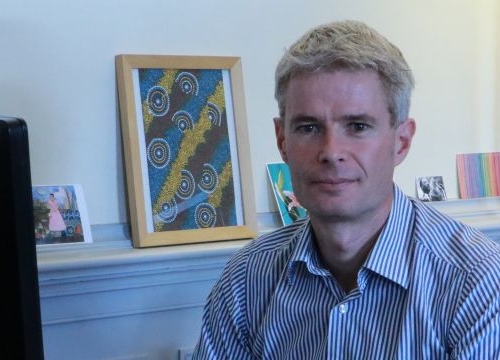Meet our Researchers: Jonathan Andrew


Geneva Academy
4 February 2020
Dr Jonathan Andrew is Research Fellow at the Geneva Academy, where he conducts research on the impact of emerging digital technologies, such as the development of social media channels, on the promotion and protection of human rights.
Tell us about you: What’s your Background?
I’ve quite an unusual professional background in that I’ve worked in many different spheres: in the corporate sector in the financial services; as a business operations specialist with a start-up in San Francisco; as a Communications Officer with an intergovernmental organization; as a Senior Legal Advisor with the Danish Refugee Council, and more recently as the Project Manager for a research project funded by the European Commission on surveillance technologies.
I originally studied Modern Languages (Russian/Czech/French) and then Economics, before my LLM and PhD in Law: I’ve found having a diverse academic background and insights into different fields extremely beneficial, particularly where innovation and tech-led changes in society are having such a wide impact on our lives.
Why Did you Choose to Work in the Field of Human Rights?
By working in the human rights sphere I feel I can make a difference in improving people’s lives. In my early voluntary work with community groups and NGOs, I saw that the disempowered lacked the means to advocate for their rights, and were often taken advantage of by others with more influence and greater resources — I’ve always felt compelled to challenge injustice. Having a legal background, but also understanding how different actors work (businesses, civil society, policymakers, etc.) from my professional roles in different countries provides many useful insights as to how I can leverage my experience to help others, and hopefully improve the quality of life for many.
What are the Research Projects you’re Currently Working on?
I am involved in two research projects here at the Geneva Academy. The first, Human Rights in the Digital Age examines and appraises the impact of innovation and the development of new information technologies on human rights, analysing in particular how this rapid transformation is impacting democracy and our different communities’ enjoyment of fundamental rights. The second, in which we are working together in partnership with the University of Essex’s Human Rights Centre, is the Human Rights, Big Data and Technology Project (HRBDT). This five-year project is primarily concerned with reviewing the implications, challenges and opportunities for human rights on issues related to the regulation of state and non-state actors in the use of big data and technology.
I’m currently working on two publications for the HRBDT research project. These studies analyse the challenges and opportunities presented by the use of big data, artificial intelligence and associated technologies from a human rights perspective and using a multidisciplinary approach. It's a great opportunity to draw upon my earlier work in economics and behavioural psychology that greatly influenced my writing for my doctorate. In addition, I'm also engaged in research for a book chapter on Smart Urban Mobility with the Max Planck Institute in Munich, which looks at the legal implications and challenges of the technological and environmental impacts of innovation in this sphere.
Why are these Projects Important?
It’s critical that we research and develop a more nuanced understanding of the role that digital technologies are having on the protection and promotion of human rights more broadly. Crucially, we really need to have a forward-looking approach and try to pre-empt future scenarios that might jeopardise fundamental rights — such as freedom of association, privacy and freedom of expression. Also, it’s vital that we study in more detail how the notion of the interdependence of these rights is evolving as technology continues to reshape how we communicate and interact.
What will be their Impact?
It’s vital that academic research has a meaningful impact, especially as the stakes are currently so high: we’re seeing on a daily basis the impact that new services, for example in the sphere of social media, are having on communities. The effects are both positive and negative, and we really need to engage all the stakeholders that can help shape beneficial change more consistently. Multidisciplinary research in this area, drawing on existing insights from areas of scholarship such as legal theory, philosophy and behavioural economics can provide new knowledge that will empower and enhance decision-making processes at every level.
According to you, what are the Key Challenges today in Human Rights?
A significant challenge across the human rights sphere is that of having different actors engage in challenging assumptions and preconceptions and assist one another in learning more about areas outside of one’s own expertise. As such, we need to become more willing to step outside our comfort zones and learn about fields of expertise that we’ve traditionally seen as being distant from our own. Information technology is bringing these disparate domains closer and closer together. We need to be looking ahead and remain conscious that change, and the challenges we face, are likely only to accelerate.
On a More Personal Note: What do you Enjoy doing in your Spare Time?
I love being outdoors and experiencing nature, especially when I’ve my camera in hand and make observations from different perspectives. These opportunities in the wild (I love the Alps and Jura especially) also inspire me in my research work, where I often ask myself how I can look at situations anew and from different angles!









